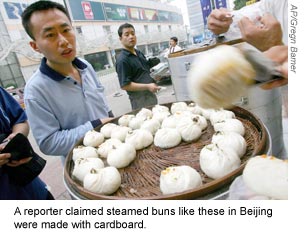New York, July 23, 2007—The Committee to Protect Journalists calls for greater transparency in the arrest of a Chinese reporter accused of fabricating news. Police arrested Beijing TV reporter Zi Beijia last week and are holding him in criminal custody following accusations that he faked a report on contaminated steamed buns, according to state news reports.
“Whether or not Zi Beijia was guilty of fabricating the report, authorities owe it to him and to the public to deal transparently with this case and make known any criminal charges against him,” said CPJ Executive Director Joel Simon.
Domestic and international news media relayed a July 8 Beijing TV report showing a street vendor filling buns with a mixture of pork and pieces of scrap cardboard soaked in caustic soda. But on July 18, Beijing TV aired a broadcast apologizing for the report, which they said was fabricated by freelance reporter Zi.
The official Xinhua News Agency reported that Zi confessed to making up the story after he was unable to verify a tip and felt pressured to produce a report.
Linked to this latest fabrication are reports of hazardous contaminations of food and medicines coming out of China. A thickening agent used in antifreeze was added to medicines, killing 94 people in Panama, according to The Associated Press. Dozens of dogs and cats in the U.S. died from pet food that was contaminated with melamine, which is normally used in plastics. On the heels of these incidents the U.S. has rejected imports from China of everything from toy trains and toothpaste to toxic fish and juice.
“Authorities can expect public doubts to persist as long as authorities keep the lid on issues of crucial concern to health and safety,” said Simon. “Clarifying the charges against Zi would be one step toward reducing those concerns.”
Seven other people have also come under investigation in connection with the Beijing TV story, according to state media. It is unclear whether any of the others were taken into custody.
Police said they had conducted an investigation into the matter, and found no cardboard-filled steam buns at dozens of stalls in the city. But Xinhua also reported that consumers in Beijing were skeptical of the police investigation.
Residents of the area where the buns were made, a courtyard in eastern Beijing’s Chaoyang district, said that producers there make fake tobacco and wine and low-quality food with the cooperation of local government officials, according to the Hong-Kong daily Ming Pao. The paper said an unidentified man shoved and threatened one of its reporters who attempted to investigate the work site that had been featured in the Beijing TV report.
Party propaganda departments overseeing print, broadcast and Internet media have suppressed further news coverage and online commentary on the incident, according to unconfirmed reports by bloggers in China.
